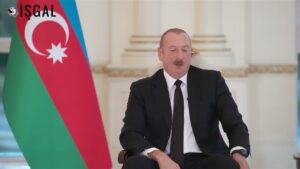“Everyone Who Could Flee, Did.”
by Lindsey Snell (with additional reporting by Baderkhan Ahmad)

When Turkey began bombing his village in Serê-Kaniyê in October, Jamil Khabat, his wife, and their young songs fled their home. “This is the third time I’ve had to leave my home because of Turkish attacks,” he said. “The last time, Turkey opened the border crossing and let [the militants] in.”
Khabat and his family are one of 50-60 staying at a school in Hasakah. Most of the families, like Khabat’s, are from Serê-Kaniyê. The desks removed from the classrooms lie in a massive pile in front of the school’s entrance. “There are no schools open here,” Khabat said. “The children aren’t studying now. And Hasakah is very crowded, because so many have fled here from the attacks.”
Turkey’s Operation “Peace Spring” has resulted in the death of hundreds, injury of thousands, and displacement of hundreds of thousands of people in Northeastern Syria, both because of Turkish airstrikes and ground attacks by the Turkish-backed Syrian National Army (SNA.) “They didn’t distinguish between civilians and military,” Khabat said, shaking his head. “That’s why we fled. They just came and bombed us all.”
Khabat says everyone who could flee Serê-Kaniyê did. “Those who weren’t able to leave…we don’t know what happened to them. We know many are dead, probably laying under the rubble of the buildings Turkey bombed. Turkey isn’t letting the UN or any other organization enter Serê-Kaniyê, so we have no way of knowing what happened to our friends and relatives still there.”
“We just want to go back to our homes,” Khabat said. “But [the SNA] has seized so many of our homes. Stolen everything. Destroyed everything. Turned our homes into military points. Where is the UN and the international super powers? Where are those who pretend to defend human rights?”
The families staying in the school are making the best of their situation. The children are in high spirits, laughing and playing outside. But at night, conditions are cramped, as three families sleep in every classroom. “Sometimes there isn’t even room to sleep,” Khabat said. “I sleep sitting up sometimes.”
During his interview, Khabat mentioned how grateful he was to those who have provided assistance to him and the other displaced civilians at the school numerous times. “I am grateful for what people have done to help us,” he said. “But no matter what they do, this isn’t like our homes. In our hometown, we have memories on every street corner. We see friends or relatives wherever we go. But if we go back to Serê-Kaniyê now…so many of our friends and relatives have been killed.”
At the nearby Hasakah hospital, Dr. Abbas Mansoura tends to dozens of patients injured by Turkish attacks. He came from his home in Sweden as a volunteer just after Turkey announced their intention to launch a new incursion. “As an internationalist and a volunteer, I came here to help the people of Rojava,” he said. “I knew they would need help.”
Dr. Mansoura lifts a blanket covering one man’s legs to show us how badly infected they are. The man may need an amputation, Dr. Mansoura says, so he will be moved to a more advanced facility when possible. “For now, all we can do is wash it with vinegar,” he said. “He is civilian, not military. Hit by a Turkish airstrike.”
“First I was at Tel Tamr hospital, where we saw the first injuries from the attacks, but then it was necessary for me to move here,” Dr. Mansoura said. “This is the biggest hospital in the area, but as you can see, it is still very primitive.” Dr. Mansoura said the hospital is suffering critical supply shortages as a result of the Turkish attacks. “When they cut the road, it made it difficult for us to get the medicines and supplies we needs for such a big hospital,” he said. “And it has made the logistics of transferring these patients very difficult.

Despite an alleged ceasefire, the doctor says he has seen new deaths and injuries every day since the Turkish incursion began. “There is no ceasefire. Between 5 days, we had more than 200 injuries. The ‘safe zone’ is not safe for the people.”
“As a medical person…as a human being, I feel here needs me,” Dr. Mansoura said. “Because these people…they have not attacked Turkey. In their world, they are alone. The 2nd [largest] army in NATO has attacked them. It is the duty of everyone to help them, because they saved the Western countries. If they didn’t fight ISIS, ISIS could occupy Europe, not only the Middle East. If it is secure in the US, in Canada, in Europe, it is because of the resistance of the people of Rojava…the YPG, the YPJ, these brave people.”
Dr. Mansoura has no immediate plans to return to Sweden. “I think I will be here for many, many, many months,” he said. “I will not leave until the Turkish attacks stop and the people are safe. If I can save a life, that’s very important to me.”


